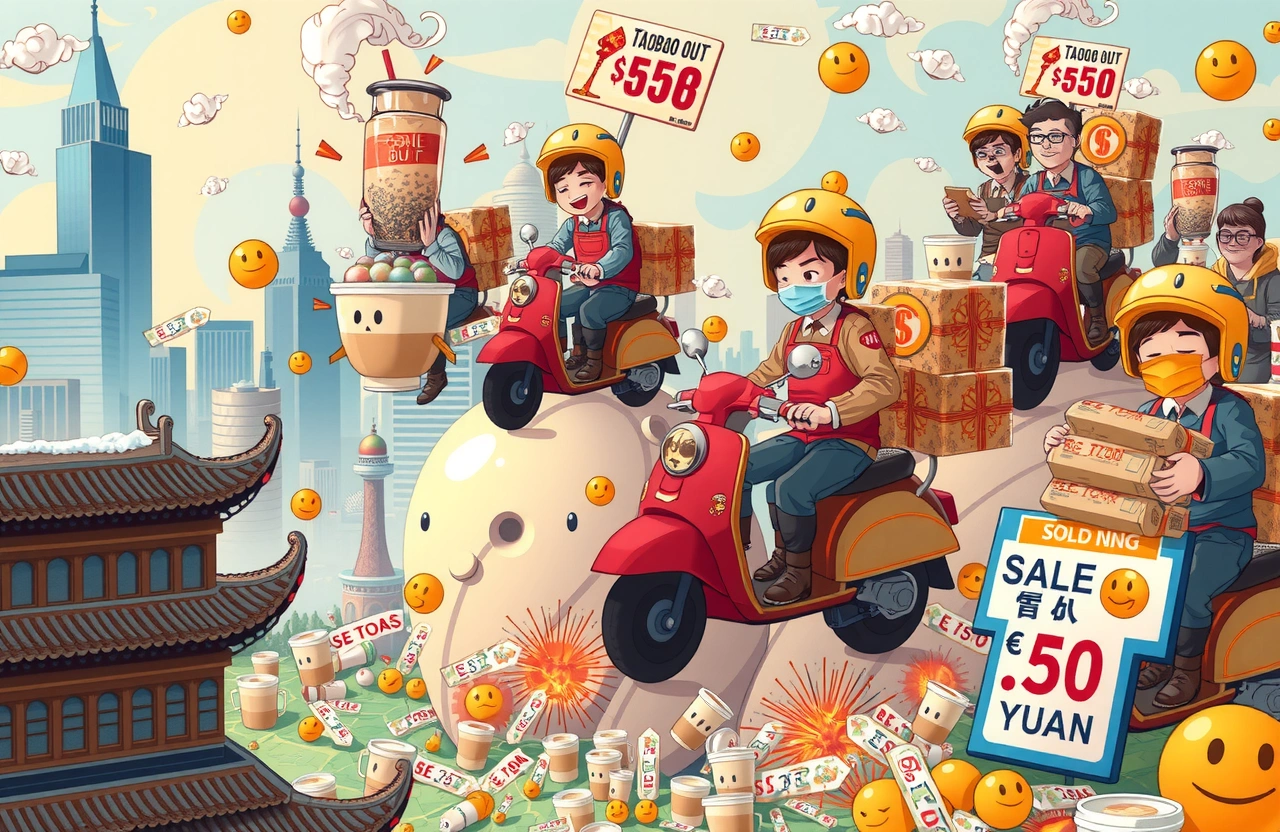The past weekend witnessed unprecedented pandemonium across China's beverage industry as Alibaba and Meituan ignited a coupon war that pushed delivery systems to breaking point. Shanghai's bubble tea staff worked frantic 14-hour shifts weeping over overflowing orders, while Beijing riders celebrating record-breaking 1700 yuan daily earnings. This paradox reveals how platform subsidies are reshaping retail economics overnight.
Article Summary
- Meituan and Taobao Quick Deals ignited coupon wars with aggressively subsidized offers, pushing orders past 80 million/day
- Bubble tea chains witnessed stock surges despite workers reporting minimal profit margins on subsidized orders
- Delivery drivers capitalized on heightened platform subsidies reaching unprecedented daily earnings
- Industry experts predict lasting market transformation beyond short-term promotions
The Discount Battlefield Emerges
Flashpoint ignited when Taobao Quick Deals announced a staggering 50 billion yuan subsidy program on July 2nd. Within 72 hours, Meituan retaliated with coupon bombardments – including full-amount discounts like “25 yuan minus 24 yuan” beverages triggering nationwide ordering frenzies. Orders shattered historical records on July 5th:
- Taobao Quick Deals/饿了么: 80+ million daily orders
- Meituan: New global instant retail record at 120 million orders
- JD.com: 25 million+ daily orders during peak period
Retail psychologist Dr. Lin Mei (林梅) observed: “Consumers couldn't resist neurologically triggering deals where even mediocre purchases felt like winning lottery tickets.” This psychological warfare drove unprecedented engagement at platform cost – Taobao's 13-week user acquisition sprint yielded 200 million daily active users according to July 7th official statement.
Beverage Chains: The Overwhelmed Frontline
While stocks surged Monday morning, ground realities revealed disturbing operational fractures in bubble tea empires. At Shanghai's Chabaidao franchise, manager Zhang Wei (张伟) showed inventory logs: “We processed 2,800 orders Saturday – triple our capacity. My staff cried between blenders.” Chabaidao stocks soared nearly 10% while his location earned under 0.50 yuan per subsidized drink.
Profitability Paradox Emerges
The subsidy trap emerged when merchants discovered hidden cost structures. Mixue Bingcheng owner Chen Li (陈丽) explained: “Platforms hadn't clarified who absorbs coupon losses. When my shop received 500 ‘free drink’ redemptions, we lost 2 yuan per unit after ingredients.” Across four major cities, 62% surveyed beverage businesses reported profit margins below 3% during event dates despite order volume increases ranging 180-300%.
CUC Brand Manager Zhou Feng (周峰) witnessed practical impacts: “We temporarily delisted low-margin items like lemon teas when realizing 1,000 daily orders yielded less net profit than 300 regular-priced orders.” The economic tension reveals flawed platform-merchant partnership structures in subsidies.
Delivery Riders: The Unlikely Gold Rush
While stores strained, drivers capitalized exponentially through layered incentives:
- Base delivery fees surged to 12-15 yuan versus standard 4-6 yuan payouts
- Volume bonuses activated after 30/60/90 deliveries
- Time-sensitive peak hour multipliers of 2-3x
Tianjin rider Yan Peng (严鹏) delivered 127 orders daily – quadruple his standard capacity: “Platforms competed paying us more to fulfill orders faster. My biggest single delivery paid 18 yuan for 800 meters.” His net 1,724 yuan earnings broke personal records.
The Unsustainable Rhythm
Behind windfalls emerged operational cracks making drivers skeptical about longevity. Beijing courier Lu Shusheng (卢书生) juggled three platforms during fixation: “Stores couldn't brew fast enough – shop queues averaged 45 minutes. System glitches assigned irrational multi-location routes wasting precious minutes.” Up to 23% efficiency drag manifested according to delivery heatmaps.
Healthcare analyst Dr. Wu Jialing (吴佳玲) warned: “We're seeing dangerous driver exhaustion patterns with average shifts extending from 7 to 12 hours without rest breaks – muscle tear incidents surged 41% last weekend.” Productivity gains masked emerging labor risks.
Structural Stock Winners to Losers
Investment currents diverged sharply between beverage makers and platform companies:
- Bubble tea stocks surged: Chabaidao (+10%), Auntie Fang (+6.43%), Naixue Tea (+3.95%)
- Platform shares dropped: Meituan (-2.73%), Alibaba (-0.48%); JD.com (+0.4%) became lone gainer
CICC analyst Mark Chen notes: “Short-term merchant suffering translates to investor enthusiasm about beverage penetration growth. Conversely, markets doubt subsidy sustainability for delivery giants – Meituan's likely 1.2 billion yuan weekend expenditure spooked shareholders.”
Trillion-Yuan Market Escalation
The battle stakes reflecting broader strategic transformations as forecasted industry valuations signal seismic shifts:
- 2023 instant retail market: 650 billion yuan (MOFCOM data)
- 2030 projected valuation: 2 trillion yuan (+207% growth)
- Post-weekend beverage category penetration: Estimated 29% nationwide (previously 17%)
Major players shift tactics for dominance:
Platforms Escalate Strategies
JD introduced “Seconds Delivery Warehouse,” revolutionizing fulfillment networks through shared-front model slashing merchant onboarding costs. Alibaba committed to pouring 50 billion yuan continuous subsidies through 2026. Meanwhile industry figureheads escalate rhetoric: JD.com founder Liu Qiangdong (刘强东) disclosed “fundamentally different” grocery-focused model while Meituan CEO Wang Xing (王兴) pledged: “We will win regardless expense magnitude.”
Analyst Projections
Digital economy expert Pan Helin (盘和林) commented: “Competition pivots from commoditized subsidies towards specialized integration – Meituan leverages offline supermarkets while Taobao converges with e-commerce ecosystems.” Win-win partnership models emerge prioritizing sustainable merchant margins over volume warfare.
Beyond the Bubble Tea Bubble
The frenzied weekend exposed contradictions transforming retail nation through delivery conflicts:
- Consumers accessing unprecedented value capture
- Store operators trapped between growth potential and unsustainable economics
- Platform companies balancing shareholder pressures against aggressive market share plays
J.P. Morgan analyst Angela Zhang summarized: “Winners require integrated solutions that convert promotional customers into everyday patrons while protecting operator economics – technological optimization becomes existential beyond subsidy blitzes.”
The resolution? Industry leaders must balance promotion strategies alongside merchant partnerships ensuring viability across all stakeholders.




